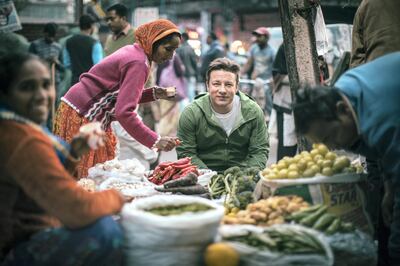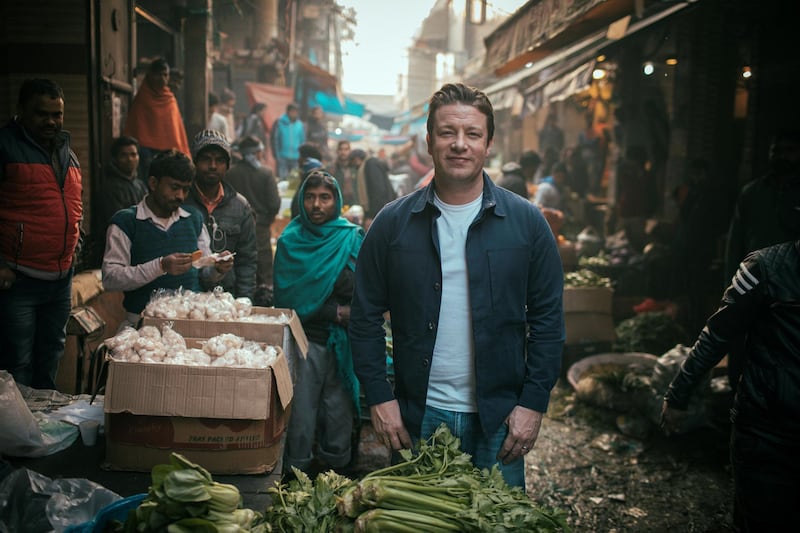Jamie Oliver's new vegetarian cooking show, Jamie's Ultimate Veg, has taken the exuberant chef from the colourful streets of India to the historic city of Bethlehem in Palestine in the name of vegetarian cuisine. In the six-episode series, Oliver meets up with local cooks and vendors to learn more about the culture of the country he's visiting, and how to create regionally-specific meat-free dishes. A full list of the other destinations Oliver visited has not yet been released.
The show premieres on Fox Life in English, with Arabic subtitles, on Sunday, October 6, and will be accompanied by a cookbook with the recipes.
But first, we've got the lowdown from Oliver himself, on everything he's learnt about herbivorous cuisine on his travels:
Who is this book and TV series for?
It’s for everyone! Obviously it’s for veggies, but importantly this book is also for meat eaters who want to include a bit more of the good stuff in their weekly meals. It’s a fully meat-free, veg-based cookbook with a good wodge of vegan options in there as well. I want to make that something to celebrate, no matter who you are. This is simply about putting good food first, and making people feel happy.
Click to see a trailer of Oliver in India:
What would you like people to take from it?
I would like everyone to take away the knowledge that vegetables can be truly joyful and fulfilling if they’re simply given the same love, care and attention that you’d give to a prime cut of meat. The great thing about delicious, well-thought-out veg meals is that everybody is welcome, and anyone can be included, no matter what their preferences are. And, whether or not we eat meat, we all want more choice.
Why go meat-free now?
I believe we’ve reached a critical mass when it comes to wanting veggie ideas. Veg-based food is no longer an ‘alternative’; it’s truly mainstream, and my job is to serve the widest possible audience with beautiful recipes that answer that demand. It’s interesting that I first started writing this book eight years ago, when it was still seen as a bit different. That’s no longer the case – sometimes in life you have to sit tight until the time is right!
Are you 100 per cent veggie, then?
Not at all. Everyone in my family eats meat and fish, but for the last five years we’ve also been trying to eat vegetarian meals – at least three days a week, and sometimes more. It’s purely because veg-based cooking ticks every single box when you’re feeding a family. And at no point are you compromising on flavour. Putting veg at the centre of your plate is often healthier, and it cuts a large amount of shopping budget, which you can either save, or use to spend on better quality meat – if you do eat it. For me, buying less, but better-welfare, meat is fundamental.

Is there one recipe in the book that could convert any veg-sceptic?
That’s a hard one to answer, but the recipes have gone down really well with our testers, who were a mix of meat-eaters and veggies. The curry chapter has loads of knockouts, and my version of a veggie pasty was a real hit – I think people were surprised by the amazing depth of flavour. The beautiful Allotment cottage pie really shifted some perceptions, too. But really there’s a whole world of delicious veggie cooking in there.
How do you get the maximum flavour out of veg?
Wow, what a question. Well, first of all, freshness helps, and surfing the seasons so the natural depth of flavour is already there when you start. Cooking over charcoal or wood emparts beautiful flavour – as well as roasting and slow-cooking, which essentially concentrates any ingredient’s natural flavours. And then, of course, kissing it with citrus, incredible olive oil and herbs. These are just a handful of ways you can get maximum flavour from veg.
Any must-have equipment for cooking veg?
Yes! A pestle and mortar, a very fine grater, one large and one small top-quality knife. A hand blender. Large bowls for dressing and marinating ingredients.
Did you try out the dishes at home?
Always. Normally I try recipes at home before I test them in the office. But frankly, there’s never a straight-line process to writing a good recipe, it’s an organic thing.
Click to see a trailer of Oliver in Palestine:
Any tips for getting kids to eat more veg?
Without being dramatic, you have to be as impactful as the junk food brands and adverts that promote unhealthy food. Firstly, cooking veg well and making it taste nice is a good start. Then have fun with your kids: shopping, buying, growing, drawing, tasting different veg. Forget about what they don't like, and concentrate on what they might like. All kids can be erratic and change their minds – their palates and understanding of food are moving targets, which means you'd have to be a superhero to get it right all the time.
Is fresh always best?
Absolutely not. Fresh is best when it's definitely fresh – so probably within 36 hours of being picked. But, chances are, frozen veg is going to be more nutritious than something that's sat in a warehouse for several days. The technology behind freezing is incredibly efficient, it's normally done within eightto 10 hours of harvest. So my take is to eat both. I always have peas, sweetcorn, broad beans, spinach and a whole myriad of fruit in the freezer.
How much veg should we be eating?
In the UK the advice is to eat at least 80g portions of veg and fruit a day. But I’d encourage everyone to eat as much as possible! Whether that’s an extra portion a day, a meat-free day every week, or adopting a totally veg-based diet. If you eat more veg, and cook recipes from this book two to three times a week, it’s highly likely that you’ll feel better and save money. If you look back to our great-grandparents’ time, it was never normal to consume animal protein in the quantity we do today. My grandad used to say: ‘Have everything in moderation and a little bit of what you like,’ And that approach just wins every single time.
Quick-fire vegetable Q&A:
What's your fave veg? That's outrageously unfair. I'm struggling to choose between wild mushrooms, acorn squash and aubergines.
Any veg you don't love? No. Honestly, no.
Most underrated veg? The onion family. Always the bridesmaid, never the bride.
Veg with biggest flavour punch? Jerusalem artichoke.
What's your fave veg season? End of August. The last breath of summer seems to produce the most tasty veg. And the beginning of autumn allows us to start flirting with the squash family.
What's the most unusual veg you've eaten? Is cactus a veg? That was unusual for me, but it's widely eaten in Mexico and very nice it is too. Cactus is open to being cooked many ways – grilled, roasted, stewed, raw … Delicious.







